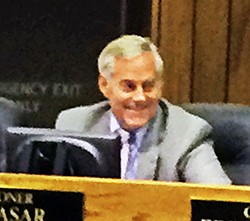
Basar, after the vote that blocked Ford’s appointments
Before Monday’s meeting of the Shelby County Commission, reporters — and at least one Commissioner — had jested that the new version of the Shelby County Commission might be controversy-free and therefore on the dull side.
Wrong. To judge by Monday’s meeting, the 2014-15 Commission might be even more gridlocked than the previous Commission, which bickered more or less constantly and remained mired in disagreement most of the time.
Only this time it could be worse. It is hard to imagine the Commission being able to operate successfully without the membership and leadership of its various committees being set, and it is equally hard to see how that more or less routine expectation will be met, given the deadlock that materialized unexpectedly on Monday.
By two votes of 7 to 5 (Republican Commissioner George Chism was absent), the Commission refused to approve the appointments to committee, boards, and commissions made by Justin Ford, the Democrat who was elected Commission chair at the previous meeting.
Commissioner Walter Bailey, the body’s longest serving Democrat, asked that the two resolutions containing the appointments be removed from the consent agenda, which is where items requiring no debate are filed, and placed on the regular agenda.
When it came time for debate, Bailey, saying he had “policy” concerns, moved to refer the two items regarding appointments back to the Commission’s general government committee. Mark Billingsley, a Germantown Republican, quickly objected.
“It’s time to move past the past. Let’s start leading together,” Billingsley said. When it came time to vote, however, Bailey was joined by 5 of the other 6 Democrats, and was supported by Republican Steve Basar, as well. Chairman Ford was the lone Democrat to vote against Bailey’s motion. That was no surprise, given the fact that it was his own appointments that were being challenged.
The second vote turned out similarly, with Basar joining 6 Democrats in favor of referring the tissue back to committee. An obviously exasperated Billingsley was prompted to say, “If this is going to be an extended bickering session, shame on us. It’s time to get on with the work of Shelby County.”
Asked after the meeting to elaborate on his position, Bailey would say only that “we were concerned about how he [Ford] got elected, with the support of the most conservative members of the Commission.” (Support from GOP members had indeed contributed significantly to the chairmanship win of Ford, who has often voted with Republicans on controversial issues.)
Other than reiterating variations of that sentiment and expressing a desire to reconsider Ford’s appointments in committee, Bailey offered no insight into how he and those who voted with him, including several new members, might proceed.
For his part, Basar met with reporters briefly after the meeting but declined to offer explanations for his votes.
GOP member Heidi Shafer had a theory, however. “Isn’t it funny that the two members who wanted to be chairman but failed to get it are trying to block the appointments of the member who did get it?”
Indeed, in the new Commission’s organizational vote two weeks ago, both Bailey and Basar had been contenders, along with Ford and Republican Terry Roiand of Millington. Bailey had the support of a Democratic bloc and, on the Commissioners’ second ballot, had come within a vote of the 7 votes need to become chair.
Basar had served as vice chair (aka chairman pro tem) in the previous Commission, an office that by tradition used to be a ritual stepping stone to the chairmanship but which in recent years has largely ceased to be. Though a Republican, he had managed to garner only vote from a fellow GOP member, that of Chism, who was absent Monday.
Roland would observe that it had seemed to have become a Commission tradition for “a wild Republican” to desert the party line, noting that GOP members Mike Carpenter and Mike Ritz had successively occupied that status in recent years. Both would come to be called RINOs [for “Republicans In Name Only”] by their Commission partymates.
In any case, a newly elected Commission whose members — freshmen and veterans alike — had seemed on an amicable footing the few prior times they had met, had managed to achieve gridlock in record time, much faster than had the overtly cantankerous and divided Commission that had preceded them.
No one quite knows what will happen if the seven members who dissented on the matter of chairman Ford’s appointments continue to do so. Only the chairman had make appointments, but his appointments are subject to approval by the full Commission. Something — and someone — will clearly have to give, if the Commission is to conduct any useful business, so much of which is done at the committee level.
Shafer said the chairman’s appointments could be referred back to committee a maximum of two times, and she suggested that Ford could make interim appointments of “acting” committee chairs and members if no agreement could be reached.
For the record, the voting on referring the two appointment resolutions went this way on Monday: For — Bailey, Reginald Milton, Van Turner, Melvin Burgess, Willie Brooks, Eddie Jones, and Basar. Against — Shafer, Roland, Billingsley, David Reaves, and Ford. Absent — George Chism.
The Commission’s standing committees, and Ford’s choices to chair them, are as follows:
Budget and Finance — Heidi Shafer
Public Words —George Chism
Hospitals and Health — Walter Bailey
Law Enforcement, Fire, Corrections, and Courts — Mark Billingsley
Land Use, Transportation, and Codes — Terry Roland
Education — David Reaves
Economic Development and Tourism — Steve Basar
Community Services — Eddie Jones
Conservation — Willie Brooks
General Government — Van Turner
Core City, Neighborhoods, and Housing — Reginald Milton
Legislative — Terry Roland
Audit — Melvin Burgess
Delinquent Tax Property —Eddie Jones